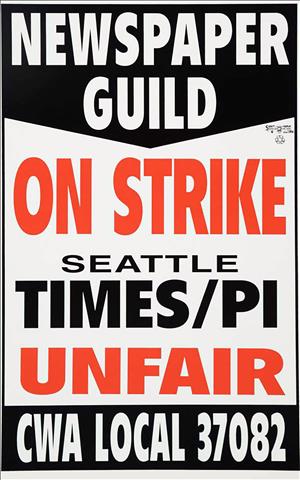On November 21, 2000, more than 1,000 members of Local 82 of the Pacific Northwest Newspaper Guild strike The Seattle Times and the Seattle Post-Intelligencer after rejecting a final contract offer. The strikers settle with the P-I after 38 days and with the Times after 49 days.
The Times and the P-I were owned separately but negotiated jointly with unions. The Newspaper Guild represented approximately 900 news, advertising, and circulation workers at the Times and approximately 130 news and business department employees at the P-I. Under a joint operating agreement, the papers maintain separate newsrooms, with the Times handling advertising, production, and circulation for both papers.
At issue were salaries and the use of a merit-pay system. Picket lines were established around the papers' buildings and the Newspaper Guild began publishing its own Seattle Union Record (named after a labor newspaper published from 1899 to 1928). During the course of the strike, the new Union Record produced 18 tabloid print editions and a website.
Mayor Paul Schell's Stand
As a show of support for strikers, Seattle Mayor Paul Schell issued an order prohibiting city workers and department heads from granting interviews or providing information to reporters from the Times or the P-I. Replacement workers and managers working as reporters would not be granted press credentials, but he would allow them to attend news conferences. Schell later changed his stand to a personal refusal to grant one-on-one interviews to replacement workers.
Joining the Newspaper Guild was Teamsters Local 174, which represented approximately 80 Times truck drivers. Teamsters Local 763, which represented 180 other drivers, reached a settlement and did not strike.
At Issue
The Newspaper Guild sought wage increases of approximately $2 an hour spread over three years (the Times offered 55 cents an hour over six years), an end to a two-tier wage structure in which suburban employees were paid less than those who worked downtown, changes to the P-I's pension plan, and changes in the number of employees who would be required to join the Guild.
The Times and the P-I continued to publish smaller editions using management employees and replacement workers. These editions were delivered free to subscribers for a time. Production workers remained on the job. U.S. Senator Patty Murray provided the assistance of a federal mediator and the parties met in Washington, D.C.
On December 28, 2000, the Guild settled with the P-I for a $3.30 an hour raise phased in over six years. Times workers stayed out pending resolution of issues over retention of replacement workers and a schedule for rehiring strikers. The Guild settled with the Times on January 9, 2001.
There Were Gains
According to Larry Hatfield, Guild Administrative Officer, writing in the Union Record:
"The contracts we've ended up with are not the best contracts. They don't have all or even most of what we wanted. But there were gains, including the elimination of the Times' draconian two-tier wage scales that discriminated against reporters and photographers just because they worked in the suburbs. Among other gains was a significant improvement in the P-I's still-unsatisfactory pension plan, the first such improvement in decades."
In 1953, The Seattle Times ceased publication for 94 days while six trade unions struck for wages. In 1936, the newly founded American Newspaper Guild struck the P-I for 103 days.

